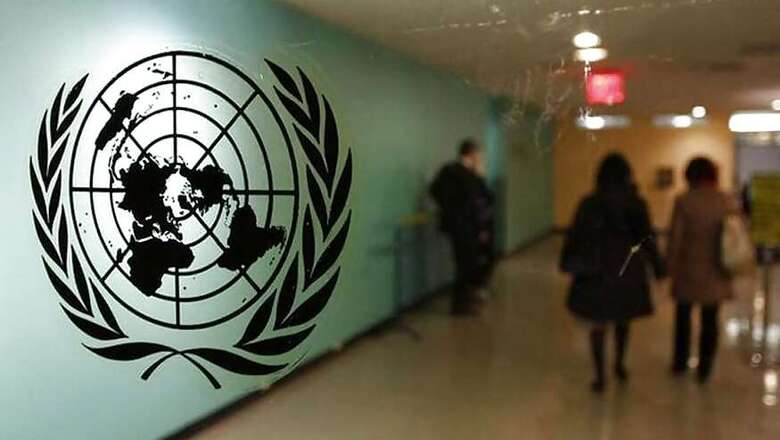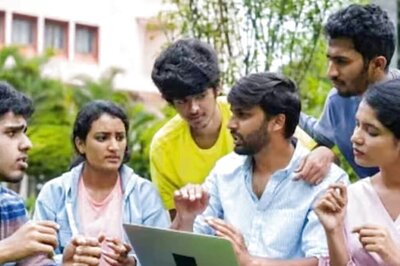
views
India at the UN has said that the expedited development of a contact tracing mobile application and Artificial Intelligence-based testing kits enabled the country's efforts to handle the coronavirus pandemic.
India's Deputy Permanent Representative to the UN Ambassador Nagaraj Naidu, speaking at a virtual high-level debate on the 'Impact of Rapid Technological Change on the Sustainable Development Goals and Targets' here on Thursday, said that new technologies like drones and tracing apps became more acceptable during the COVID-19 pandemic than they were before.
Referring to the Aarogya Setu mobile app, he told the high-level meeting that the expedited development of the contact tracing app and innovative Artificial Intelligence-based COVID-19 testing kits have enabled India's efforts to handle the pandemic.
The app was launched by the Indian government on April 2 to help people assess their risk of getting infected with coronavirus and alert authorities if they have come in close contact with an infected person.
However, we still have to deal with issues relating to cyber security, data privacy and the spread of misinformation, Naidu said.
New technologies offer incredible promise: from increasing the productivity of systems while lowering emissions and waste; to enhancing food security and efficiency of global supply chains, or breakthrough discoveries in areas like new medicines, or new materials, he said.
The envoy said that trust and acceptance issues will impact the adoption rates for new technologies. The Aarogya Setu app uses contact tracing to record details of people who may have come in contact with a coronavirus patient.
The app, which is available in 12 languages and various platforms, has over 114 million users as on May 26, which is more than any other contact tracing app in the world.
Naidu said that while technology is neutral, its deployment and access to its benefits are not.
"We have to remember that once a new technology rolls over you, if you're not part of the steamroller, you are part of the flattened road, he said, adding that the unique benefits and profound risks arising from the dramatic increase in computing power and interconnectivity in the digital age falls in the realm of the "known unknowns".
Addressing the high-level meeting, UN Secretary-General Antonio Guterres said that digital technology is central to almost every aspect of the response to the COVID-19 pandemic, from vaccine research to online learning models, e-commerce and tools that are enabling hundreds of millions of people to work and study from home.
The UN chief stressed that at the same time, COVID-19 has provided dramatic evidence of the threats posed by the ungoverned use of digital technology, from exclusion and inequality, to surveillance, human rights abuses and cybercrime.
The pandemic has ushered in some of the most intrusive surveillance technologies we have ever seen, together with a significant increase in cynical ransomware attacks on hospitals and health care facilities.
"Meanwhile, the danger of digital fragmentation is increasing, exacerbated by geopolitical divides, technological competition and polarization," he said.
Naidu said at the meeting that across the Sustainable Development Goals (SDGs) and their 169 targets, it is suggested that 70 per cent of the targets could be achieved through application of digital technologies.
He stressed that each industrial or technological revolution has had winners and losers. "We cannot afford the fourth industrial revolution to not be inclusive," Naidu said.
He highlighted efforts by India to deploy science and technology to improve lives of peoples - from green revolution in food security to remote sensing for disaster risk reduction and to nuclear energy for healthcare.
India has also used Information and Communication Technology (ICT) to leapfrog and upscale financial inclusion by linking people's bank accounts, national identification numbers and mobile phone services, he said, adding that India has close to 670 million internet users where the cost of 1 GB of data is just about 20 cents, compared to the global average of $ 9.
According to Johns Hopkins Coronavirus Resource Center, the coronavirus has infected over 73,00,000 people and killed than 4,16,000 across the world. The US is the worst affected country with over 2 million cases and more than 1,11,000 deaths.
India's tally stands at 2,97,535, while the death toll is 8,498, according to the Union Health Ministry data. The contagion, which originated in China's Wuhan city in December last year, has also battered the world economy with the International Monetary Fund saying that the global economy, which was in a sluggish recovery even before the coronavirus outbreak, is now bound to suffer a "severe recession".














Comments
0 comment